#arab spring
Photo
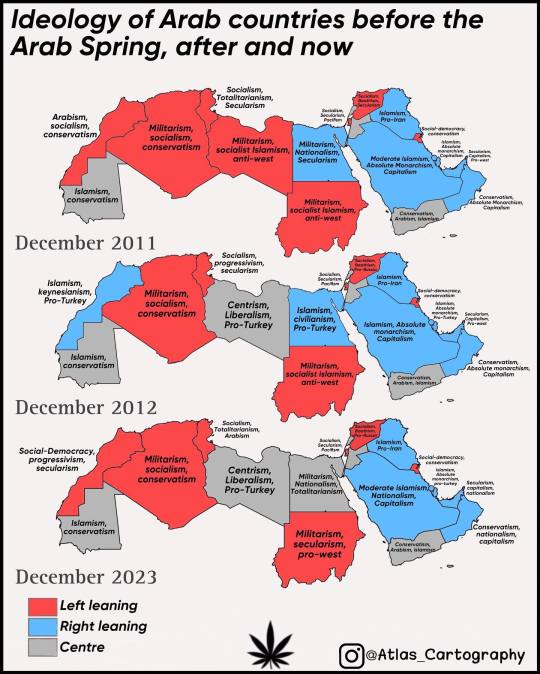
Ideologies of Arab countries before the Arab Spring, after, and currently.
by atlas_cartography
92 notes
·
View notes
Text










My girlfriend and I brainstormed a sequel to Malcolm in the Middle covering Malcolm's presidency. Enjoy!
#malcolm in the middle#frankie muniz#bryan cranston#christopher masterson#lizzo#potus#arab spring#kim jong un#malcolm wilkerson#hal wilkerson#lois wilkerson#dewey wilkerson#francis wilkerson#classic sitcom#family sitcom#comedy
181 notes
·
View notes
Text

It’s been about one month since Aaron Bushnell, active duty serviceman, immolated himself in front of the DC Israeli embassy.
Today the UN called for a “non-binding” (qualifier added by US) ceasefire for the remainder of Ramadan (~two weeks). Meanwhile, yesterday Biden unilaterally approved another 3 billion dollars to be sent to Israel, begging the question, will Israel truly abide by a ceasefire?
In the past (years, not since Oct 7) ceasefires have been enacted, which Hamas and Palestinian Authority have respected, but Israel meanwhile would continue to control Gaza’s water, food & medical access, and yes, inflict violence upon Palestinian peoples. Knowing this, what is the incentive for Hamas to abide by a false ceasefire? when Israel now continues to murder children, rape women and cripple a population indefinitely.
Today I found my first real bit of info re: the Arab Spring of 2011. I worked within a large box bookstore at this time and through my years there, I was unable to find any literature on this topic. It’s been about 6 years and this may have changed, but typing “Arab Spring” into the billion dollar search function, there were NO RESULTS. This doesn’t mean the info wasn’t out there, somewhere, only that access wasn’t condoned, and academic thought was likely restricted (or … that’s how I understand it).
This is the podcast I found today and learned from. The show “Throughline” is really worthwhile in its entirety, but this episode shows us the power of social media and organizing dissent. On this near- anniversary of Aaron Bushnell political and radical act, I think a lot about the man in Tunisia who self immolated in January of 2011. His name was Mohamed Bouazizi, and his death sparked the Arab Spring,
Find it here.
#free palestine#palestine#gaza#free gaza#current events#Arab spring#end Islamophobia#stop israel#we are stronger together#podcast#podcast rec#Throughline#us politics#israeli apartheid#Palestine US solidarity#social media#TikTok#Facebook#education#Mohamed Bouazizi
21 notes
·
View notes
Text

this picture always makes me feel like crying
#jan 25#egypt#omar el sherif#omar sharif#arab spring#... something about how the elderly in egypt just couldn't believe that it was finally happening we were finally doing it...
16 notes
·
View notes
Text
One of the most famous—and famously outspoken—Egyptologists is Hawass, Egypt’s former minister of antiquities. For decades, he has worked to return a number of high-profile Egyptian artifacts to his country, including the Rosetta Stone (housed at the British Museum), the Dendera Zodiac (in the Louvre) and the bust of Nefertiti (in the Neues Museum). With the opening of the GEM imminent, Hawass in October launched an online petition asking these European museums to send the Egyptian treasures back home. So far, the petition has garnered more than 130,000 signatures.
“These are our monuments,” Hawass says. “The Rosetta Stone is the icon of our Egyptian identity. Without the Rosetta Stone, there is no archaeology of Egypt. It’s really sad to see in the [Dendera] temple a replica of the zodiac, and the original is in France.”
In September, a group of Egyptian archaeologists launched a separate petition similarly seeking to return the Rosetta Stone. Called Repatriate Rashid, the campaign demands that Egypt’s prime minister submit an official request to the British Museum. Complicating both repatriation pushes is the fact that the London institution is governed by an act of British Parliament expressly prohibiting the return of artifacts unless they are “duplicates” or “unfit to be retained in the collections of the museum.” Even in other instances when the museum wanted to return objects, court rulings and strict policies have prevented it from doing so.
While some key ancient artifacts remain abroad, Egyptian officials have had considerable luck in securing others’ return.
“Egypt is one of the countries that’s had the most consistent, driven repatriation effort,” says Alice Procter, a historian of material culture and the author of The Whole Picture: The Colonial Story of the Art in Our Museums and Why We Need to Talk About It. “The Egyptian government has been largely pretty successful in getting objects returned, and that’s partially due to the fact that so many pieces have been taken illegally in a very easily documented way.”
Many of these recently returned, illegally trafficked artifacts were looted in the chaos of the 2011 Arab Spring and sold to museums like the Metropolitan Museum of Art in New York City. Following international investigations, the Met has sent dozens of pieces back to Egypt, including the golden coffin of a high-ranking priest, which is now on display at the NMEC. In May, French prosecutors charged the former president of the Louvre, Jean-Luc Martinez, with complicity in fraud and money laundering linked to Egyptian antiquities purchased by the Louvre Abu Dhabi. The court’s decision is expected in February.
“Egypt has put in every possible effort to try to repatriate its objects,” says Ahmed Issa, Egypt’s newly appointed tourism minister. “But we’re also 100 percent committed to all the laws. Every piece that has left Egypt lawfully is owned by the person who owns it. But every piece that has left Egypt unlawfully, we’re going to exert every possible effort to return that piece to Egypt.”
— Who Gets to Tell the Story of Ancient Egypt?
#lauren keith#who gets to tell the story of ancient egypt?#history#archaeology#museums#colonialism#arab spring#egypt#ancient egypt#usa#france#united arab emirates#zahi hawass#alice proctor#jean-luc martinez#ahmed issa#british museum#neues museum#metropolitan museum of art#louvre#louvre abu dhabi#rosetta stone#dendera zodiac#nefertiti bust
7 notes
·
View notes
Text
Further reading:
Hyperallergic: The British Museum Isn’t Doing Enough to Fight Illegal Antiquities Trafficking, October 27, 2020
Hyperallergic: Sale of Possibly Looted Yemeni Objects Raises Red Flags, November 6, 2022
#Smithsonian#National Museum of Asian Art#Yemen#Yemeni#war#arabian peninsula#art#art history#conservation#repatriation#Hyperalleric#news#art world#museums#Morris Khouli#Mousa Khouli#Egypt#Arab Spring#us state department#TimeLine Auctions#archaeology#United Arab Emirates#Saudi Arabia#British Museum#colonialism#National Museum of Afghanistan#Iraq#Afghanistan
12 notes
·
View notes
Text


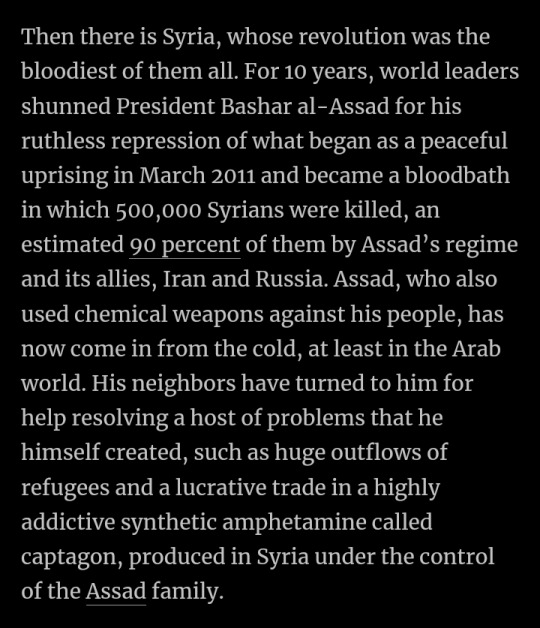
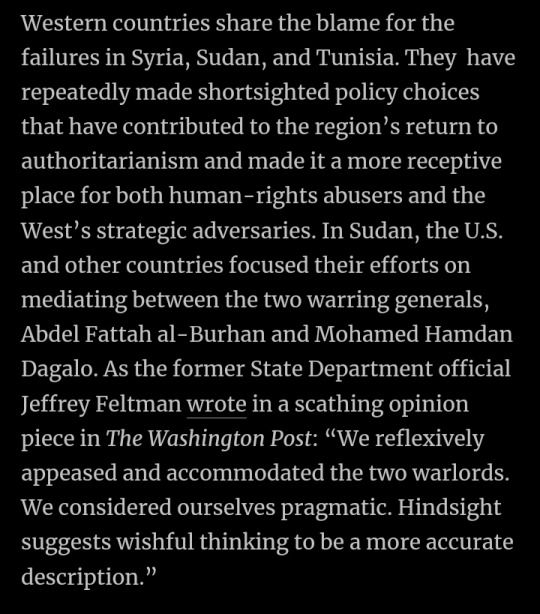
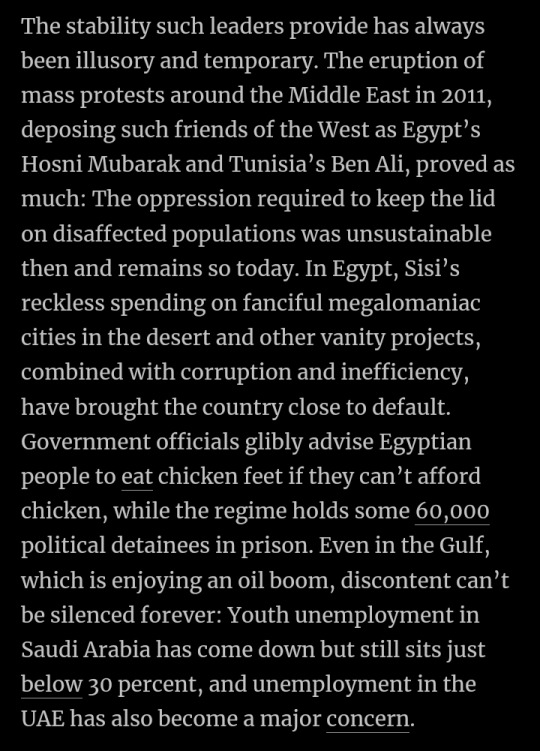

4 notes
·
View notes
Text
as a retrospective, occupy wall street was the endpoint of the kind of ‘horizontalist’ politics that was popularized with the anti-globalization movement. the involvement of adbusters in establishing the initial ows is more than enough to show us how direct this influence is. underpinning the anti-globalization movement in the global north was a reliance on the framework consecrated by liberalism, and idealist notions that democracy had been distorted from its optimal function by the presence of trans-national corporations bypassing the power of the state. the idea that in the first instance, the state is an instrument of class power - specifically the power of the bourgeoisie, in the capitalist epoch.
occupy’s failure, is the shared failure of that anti-globalization movement, and in between - that of the arab spring, which had seemingly exhausted imagination for another kind of social modality other than one informed by neoliberalism - islamist or not. even the anti-globalization movement came to fore as a sort of post-cold war rebuke of state socialism and the vanguardist politics used to set it up, only to fumble once confronted with the hard power of the state and especially great power conflicts - in a way that ‘actual existing socialist’ states could not do. the occupy movement also forgoed the kind of deep organising that could actually build class consciousness and galvanise the working class into making demands.
i’m not saying that the occupy movement was bad, or counterproductive: it politicized a generation of people, and broke out of this anhedonic, apathetic morose typical of atomised subjects under neoliberalism. I’m just saying that it was no threat to the ruling class, to any corporations, to anyone wearing the robes of institutional power. pro-ows assessment would rather we think how well ows spread and that was the real victory, like there wasn’t a demand for the neoliberal epoch - whether it was explicity stated or otherwise.
#occupy wall street#ows#occupy movement#anti-globalization movement#adbusters#horizontalism#socialism#anarchism#reformism#arab spring#neoliberalism#class struggle#state socialism#working class#organising#marxism#direct action
4 notes
·
View notes
Text
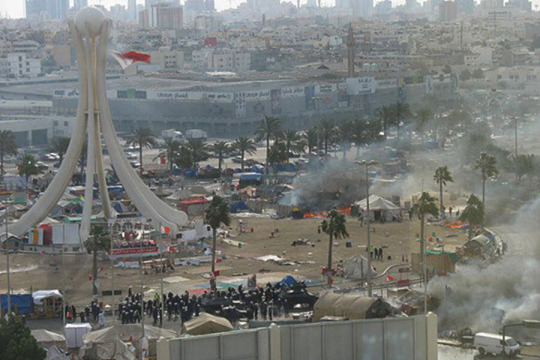

Currently reading about the rise of the Arab Spring and the pearl roundabout in Bahrain is such an interesting landmark.
5 notes
·
View notes
Photo

Results of Arab Spring.
The Arab Spring was a series of anti-government protests, uprisings, and armed rebellions that spread across much of the Arab world in the early 2010s. It began in response to corruption and economic stagnation and was first started in Tunisia. From Tunisia, the protests then spread to five other countries: Libya, Egypt, Yemen, Syria, and Bahrain, where either the ruler was deposed (Zine El Abidine Ben Ali, Muammar Gaddafi, Hosni Mubarak, and Ali Abdullah Saleh) or major uprisings and social violence occurred including riots, civil wars, or insurgencies. Sustained street demonstrations took place in Morocco, Iraq, Algeria, Iranian Khuzestan, Lebanon, Jordan, Kuwait, Oman, and Sudan. Minor protests took place in Djibouti, Mauritania, Palestine, Saudi Arabia, and the Moroccan-occupied Western Sahara.
145 notes
·
View notes
Text

Why 'The West' Killed Gaddafi
Libya is perhaps Africa‘s largest oil producer. Gaddafi had a plan to quit selling Libyan oil in U.S. dollars, demanding payment in gold-backed “dinars” (a single African currency made from gold), was one of many reasons why the West, especially Hilary Clinton, wanted him dead....it would of devastated the dollar. The regime, sitting on massive amounts of gold, estimated at close to 150 tons, was also pushing other African and Middle Eastern governments to follow suit.
Another reason why his "regime" had to go, was WATER. In Libya, theres a man made river. It's a water-project that Gadaffi started about..18 years ago. There are 7 huge underground reservoirs of "ice age-pure clear water" thats in Southern Libya. So Gadaffi started to build conduits/aqueducts to send this fresh water towards the coast, so they can irrigate and make Libya a self sustaining agriculture power. Multi-national corporations(Jews) couldn't allow that to happen. Also, many years ago, the Israelis put a radio behind Gadaffi's bunker, to broadcast fake terrorist threats to brainwash the world with.
#muammar gaddafi#libya#water#oil#agriculture#money#united states#new world order#arab spring#africa#gold#war#middle east#false flag
8 notes
·
View notes
Text
June 12, 2023
By Jason Horowitz and Rachel Donadio
ROME (The New York Times) — Silvio Berlusconi, the brash media mogul who revolutionized Italian television using privately owned channels to become the country’s most polarizing and prosecuted prime minister over multiple stints in office and an often scandalous quarter-century of political and cultural influence, died on Monday at San Raffaele Hospital in Milan. He was 86.
His death was confirmed in a statement by Prime Minister Giorgia Meloni, with whom he was a coalition partner in the current Italian government. No cause of death was given, but he was hospitalized last week as part of his treatment for chronic leukemia and other ailments.
To Italians, Mr. Berlusconi was constant entertainment — both comic and tragic, with more than a touch of off-color material — until they booed him off the stage. But he kept coming back. To economists, he was the man who helped drive the Italian economy into the ground. To political scientists, he represented a bold new experiment in television’s impact on voters. And to tabloid reporters, he was a delicious fount of scandal, gaffes, ribald insults and sexual escapades.
A gifted orator and showman who sang on cruise ships as a young man, Mr. Berlusconi was first elected prime minister in 1994, after the “Bribesville” scandals, which had dismantled Italy’s postwar power structure and removed his political patron, former Prime Minister Bettino Craxi, from office. Mr. Berlusconi famously announced that he would “enter the field” of politics to deliver business-minded reforms, a move that his supporters framed as a selfless sacrifice for the country but that his critics considered a cynical effort to protect his financial interests and secure immunity from prosecution related to his business affairs...
... He built an elaborate tomb for his family and friends at his villa in Arcore, outside Milan. He had a lifetime of epitaphs to choose from, uttering one candidate on one of his TV channels in 2009.
“The majority of Italians in their hearts,” he said, “would like to be like me.”
#Silvio Berlusconi#Italy#Forza Italia#Giorgia Meloni#European Union#Brothers of Italy#AC Milan#Arab Spring#Moammar Gadhafi#Mario Draghi#Vladimir Putin#love the man or hate him (more of the latter for me)... in the context of this obituary that final line was killer#and it might actually have been or still is true#obituary#New York Times
1 note
·
View note
Text
Egyptian protesters light up military helicopters with thousands of laser pens
#world news#arab news#revolution#helicopter#protest#egypt news#cairo egypt#politics#arab spring#egyptphotography
2 notes
·
View notes


